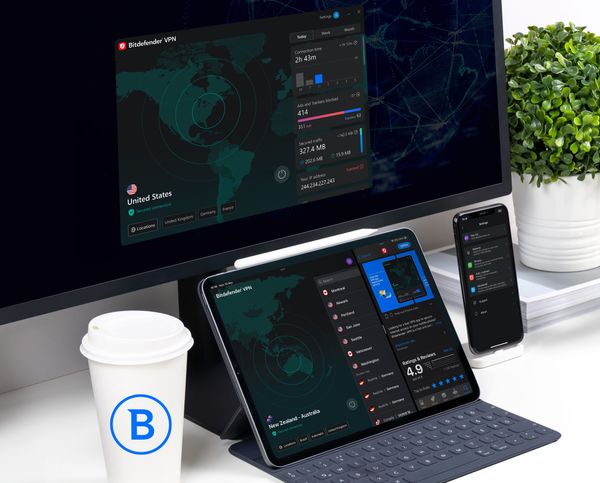WireGuard VPN Protocol: The New Frontier of Digital Privacy and Security

In an era where every click and search is subject to scrutiny, the online world can feel like a vast open field where our actions are visible to all. This is where the Virtual Private Network (VPN) concept steps in, acting as our personal invisibility cloak.
Understanding the Digital Cloak
Think of a VPN as your exclusive tunnel in the vast world of the internet. Instead of traveling on the open roads, where anyone can see and track you, you journey through a secure, private tunnel that ensures your online destinations and actions remain your business alone.
At the core of how a VPN operates and ensures this secrecy is its protocol, akin to the blueprint of the tunnel, which dictates its strength, security and speed.
Delving deeper, a VPN takes your internet activity and cloaks it in a layer of encryption. This process disguises your actions, making them unintelligible to cybercriminals, government agencies, intrusive advertisers and other potential eavesdroppers.
The Role of Protocols
Just as the reliability of a courier service lies in its means of transport and its route, the potency of a VPN is determined by its chosen protocol. The protocol is the framework that shapes a VPN’s security and operational efficiency.
Some means of transportation are quick but fragile (think of a racing car), while others are robust but slow (like an armored truck). The same applies to VPN protocols: some sacrifice security to focus on speed, while others take it slower but safer.
Two crucial criteria dominate the choice of a VPN protocol: safety (its ability to protect without fail) and speed.
Enter WireGuard
A new player on the VPN block is gaining traction for its innovative approach: WireGuard. What sets it apart?
1. Simplicity and Speed:
Unlike its complex predecessor, OpenVPN, WireGuard is designed to be straightforward, with less than 4,000 lines of code. This simplicity leaves fewer places for bugs to hide and, thus, potentially fewer vulnerabilities. It also results in swifter connection times and more stable connections, especially when shifting between networks.
2. Cryptographic Prudence:
WireGuard employs modern cryptographic protocols. Without delving too deeply, this means it uses the latest encryption methods to ensure your data is scrambled in the most secure way possible. Even if someone manages to capture your data, deciphering it would be a monumental task.
3. Privacy First:
By default, WireGuard is designed so it doesn’t store any logs of your activities, meaning there's no record of the websites you visit or the data you transmit. It's akin to buying a book with cash rather than a credit card: no paper trail left behind.
4. Seamless Implementation:
Though WireGuard is not as plug-and-play as OpenVPN, it offers more flexibility, allowing VPN providers to tailor it to their product more efficiently. This means each VPN provider can mold it to its particular system, ensuring optimal performance and safety.
The Road Ahead for WireGuard
While the benefits are evident, WireGuard is not without its challenges:
- Adoption: As it’s a new protocol, not all VPN providers have adopted it yet. While technically possible, mass implementation requires VPN companies to make certain adjustments and iron out potential flaws.
- Experimental Nature: It's still a relatively fresh face in the VPN world. As with any new technology, unforeseen vulnerabilities or issues may arise over time. Users adopting WireGuard should be aware that it’s still nascent and may suffer hiccups.
Conclusion
In the vast ocean of VPN protocols, WireGuard emerges as a promising contender, aiming to balance speed with security, all while emphasizing user privacy.
While it may not be the unequivocal best, its potential for customization and its modern approach to cryptography make it an exciting choice for those looking to bolster their online security.
For those keen on comparing WireGuard with other VPN protocols, refer to our comprehensive comparison article. Remember, in our digital age, staying informed is the first step towards staying safe.
tags
Author

Vlad's love for technology and writing created rich soil for his interest in cybersecurity to sprout into a full-on passion. Before becoming a Security Analyst, he covered tech and security topics.
View all postsRight now Top posts
How to Protect Your WhatsApp from Hackers and Scammers – 8 Key Settings and Best Practices
April 03, 2025
Outpacing Cyberthreats: Bitdefender Together with Scuderia Ferrari HP in 2025
March 12, 2025
Streamjacking Scams On YouTube Leverage CS2 Pro Player Championships to Defraud Gamers
February 20, 2025
How to Identify and Protect Yourself from Gaming Laptop Scams
February 11, 2025
FOLLOW US ON SOCIAL MEDIA
You might also like
Bookmarks







